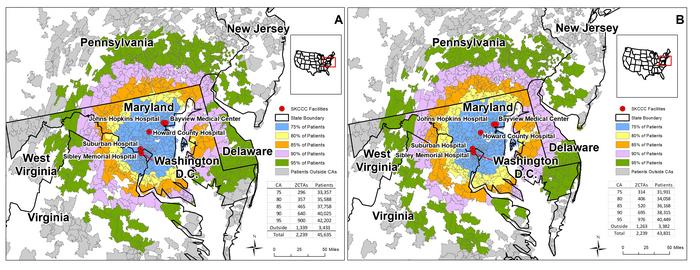Malaria Parasite Employs Innovative Molecular Strategy to Evade Immune Detection
Researchers at Weill Cornell Medicine have uncovered a groundbreaking mechanism by which Plasmodium falciparum, the parasite responsible for the deadliest form of malaria, evades the human immune system for extended periods. This pathogen, transmitted through mosquito bites, has long baffled scientists due to its ability to establish chronic infections that can persist asymptomatically, sometimes for […]


Researchers at Weill Cornell Medicine have uncovered a groundbreaking mechanism by which Plasmodium falciparum, the parasite responsible for the deadliest form of malaria, evades the human immune system for extended periods. This pathogen, transmitted through mosquito bites, has long baffled scientists due to its ability to establish chronic infections that can persist asymptomatically, sometimes for years. The new study reveals that the parasite can selectively silence an entire subset of its var gene family, enabling it to become nearly invisible to immune defenses—a discovery that reshapes our understanding of malaria pathogenesis and persistence.
Malaria remains one of the most devastating infectious diseases worldwide, afflicting hundreds of millions annually and causing close to 600,000 deaths each year. Conventional malaria control strategies predominantly target those who exhibit symptoms, particularly children, in endemic areas. However, the findings from this research suggest that asymptomatic adults, who harbor cryptic infections, may serve as hidden reservoirs, facilitating ongoing transmission cycles. This revelation underscores the challenge of malaria eradication and demands revised public health strategies.
The parasite’s survival strategy is intimately tied to the var gene family, a collection of approximately 60 genes encoding variant surface antigens known as PfEMP1 proteins. These antigens are displayed on the surface of infected red blood cells and mediate cytoadhesion to the vascular endothelium, a process that prevents clearance by the spleen. Previous scientific paradigms posited that P. falciparum strictly expresses only one var gene at a time in a mutually exclusive manner, cycling through the repertoire to evade the host’s adaptive immune surveillance.
Intriguingly, once the parasite exhausts its var gene set, it faces a conundrum: reactivating a previously expressed gene would trigger a rapid immune response, leading to its destruction. How P. falciparum maintains chronic infections despite this limitation has remained an unresolved mystery. To interrogate this phenomenon at unprecedented resolution, the research team employed single-cell RNA sequencing, allowing them to profile var gene expression profiles at the individual parasite level.
Their analyses revealed a remarkable transcriptional plasticity within the parasite population. While many parasites adhered to the canonical one-gene expression pattern, a subset simultaneously expressed two or three var genes, a transient state presumed to represent gene-switching events. More strikingly, the team identified a unique “null” expression state characterized by an absence of detectable var gene transcription. This null state had eluded previous studies relying on population-level assays, highlighting the power of single-cell technologies in unveiling pathogen heterogeneity.
The discovery of this var-null state challenges existing dogma and suggests a novel immune evasion tactic. Without var gene expression, the parasites forgo producing PfEMP1 proteins, rendering the infected erythrocytes devoid of cytoadhesive properties. This raises the question of how these host cells escape the spleen’s filtering function, which typically removes aberrant or infected red blood cells. The researchers propose that these stealth parasites might sequester in anatomical niches such as the bone marrow or in specialized red blood cell pools within the spleen where circulation is limited, thereby circumventing immune clearance.
This anatomical hiding constitutes a prime strategy for P. falciparum to persist undetected within the human host, allowing it to sustain chronic infections and maintain transmission potential. Understanding these cryptic reservoirs is crucial, as they may represent Achilles’ heels for malaria elimination efforts. The revelation of this var gene silencing mechanism opens new avenues for therapeutic interventions designed to target and disrupt these silent parasite populations.
Future investigations spearheaded by Dr. Kirk Deitsch and his team aim to perform field studies in malaria-endemic regions of West Africa, seeking to directly identify and characterize these elusive parasite reservoirs. Success in these endeavors could inform vaccine design and the development of drugs tailored to expose or eliminate immune-evasive parasites, dramatically improving malaria control programs worldwide.
The research also exemplifies the emerging insights gained through single-cell transcriptomic approaches in infectious diseases. By dissecting expression variability at the cellular level, scientists can detect transient states and rare phenotypes that significantly impact pathogen biology and host interactions. This technical advancement propels our comprehension of complex diseases like malaria beyond averages and bulk analyses, toward a nuanced view of biological diversity and adaptation.
Ultimately, the study not only elucidates a clever survival ploy employed by Plasmodium falciparum but also highlights formidable obstacles to malaria eradication, emphasizing the need for comprehensive strategies that consider both symptomatic and asymptomatic infections. Through innovative molecular profiling and targeted field research, this work holds promise in guiding policies and practices aimed at defeating malaria, a disease that continues to impose a heavy global health burden.
Subject of Research: Immune evasion mechanisms of Plasmodium falciparum through transcriptional regulation of var genes
Article Title: scRNA-seq reveals transcriptional plasticity of var gene expression in Plasmodium falciparum for host immune avoidance
News Publication Date: 16-May-2025
Web References: DOI: 10.1038/s41564-025-02008-5
Image Credits: WCM (Weill Cornell Medicine)
Keywords: Malaria, Infectious diseases, Parasitic diseases, Plasmodium infections, Immune system, Parasitology
Tags: asymptomatic malaria carrierschronic malaria infectionshidden reservoirs of malariainnovative malaria control strategiesmalaria parasite immune evasionmalaria pathogenesis researchmalaria transmission dynamicsPfEMP1 protein significancePlasmodium falciparum infection mechanismspublic health strategies for malariavar gene family functionWeill Cornell Medicine malaria study
What's Your Reaction?

































